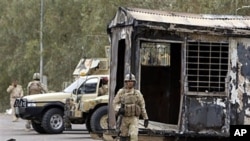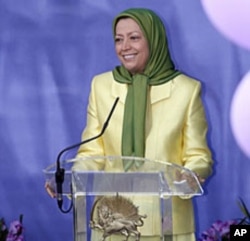A raid by Iraqi security forces on a camp of Iranian opposition exiles earlier this month set off an international outcry about human rights abuses and raised old concerns about Camp Ashraf and its inhabitants. The United Nations reports the raid left 34 dead and called on the Iraqi government to launch an inquiry. The inhabitants of Camp Ashraf - some 3,500 members and supporters of an Iranian opposition group, the People’s Mujahedin, also known as the MEK or the PMOI - were once welcomed by Iraqi dictator Saddam Hussein. But now they are more often seen as an irritant for Baghdad and the recent attack again raised questions about just who the Mujahedin are and what their future is.
Exiled Iranians shout "Killers!" at Iraqi soldiers guarding their desert camp. These photos they say show victims killed by Iraqis in a raid on Camp Ashraf, northeast of Baghdad and base of the People’s Mujahedin.
The group has been in Iraq for decades - given shelter by Saddam Hussein in the 1980’s during the Iran-Iraq War.
But on this day there was not much to see when journalists toured parts of the Camp the day after the alleged raid.
Iraqi Defense Ministry spokesman Mohammed al-Askari said security forces had come in peace, but were threatened and insulted. "They [residents of the camp] acted in a way, which is against the law as if they were not in Iraq and as if they were not covered by Iraqi law," he said.
Details remain sketchy as to what actually happened. But the People’s Mujahedin released this video showing what they say was the massacre of Camp Ashraf residents by Iraqi forces. VOA is unable to independently verify its content, posted on YouTube and shown at a recent pro-Mujahedin press conference in Washington.
Major U.S. political figures attended, including former governor and Democratic presidential contender Howard Dean. "This is about murder and ultimately this is about genocide and for our American troops to be standing a few kilometers away watching this happen is wrong and I call upon the president of the United States to stop this now," he said.
Members of the People’s Mujahedin, or MEK, surrendered their weapons and came under the protection of U.S. troops following the U.S.-led invasion of Iraq in 2003. But in 2009, control of the camp was transferred from the U.S. military to the Iraqi government.
That raised concern among MEK members and supporters and they’ve often taken those concerns to the streets in European capitals.
History of People's Mujahedin
Founded by Iranian students in the mid-1960’s, the People’s Mujahedin mixed Marxist, left-wing and Islamic ideology. In those early days they fought against the then-Shah Mohamed Reza Pahlavi, then briefly sided with the country’s new rulers after the Islamic Revolution of 1979.
According to the U.S. State Department, the Mujahedin were linked to the killing of at least six U.S. military and civilian personnel in Iran before the revolution and were involved in the invasion of the U.S. Embassy and the capture of U.S. diplomats as hostages in the months that followed. The State Department put the group on its list of foreign terrorists in the 1990s and it remains on the list to this day.
MEK members and supporters are spread throughout Europe, especially in France where their top leadership, including Mariam Rajavi, lives. They say they seek to overthrow the Islamic regime and replace it with a secular democratic government. They like to portray themselves as freedom fighters.
'Mind-control cult'
But for Massoud and Anne Khodabandeh the group is anything but democratic. They are former members of the British branch of the People’s Mujahedin, now living in the United Kingdom. "I was very struck by them. They were very disciplined," said former MEK member Anne Singleton Khodabandeh.
Anne says she was a low-level recruit, and Massoud, a high-ranking figure, but both left disillusioned. "We quickly discovered that where we had been was a mind-control cult. A very dangerous and destructive mind-control cult," she said.
Who are supporters?
Despite such criticism, the group has supporters, including important friends in Washington - among them former top officials in the administration of George W. Bush.
"It certainly helps for the MEK to remain a bone in the throat of Iran and a diversion to the regime because of its potential to undermine the regime," said former attorney general Micahel Mukasey.
Dana Perino, a former White House spokeswoman and a member of the U.S. Broadcasting Board of Governors that oversees VOA, joined others at a recent forum on the Iran-Iraq relationship. "So to the women of Camp Ashraf, I express my admiration...," she said.
"The organization is very effective in putting on a face...," said Near East analyst Patrick Clawson says the MEK knows how to appeal to Washington audiences. "They have presented themselves as a democratic movement in Iran which many people around the world, many people in the United States are sympathetic to - the democratic movement in Iran. "
Push for removal from terrorist list
More recently, MEK members and supporters have taken to the streets - lobbying to be taken off government terrorist lists. They are now pushing hard for removal from the U.S. State Department foreign terrorist list.
"Many of the lawmakers repeatedly in the United States asked the State Department and Secretary Clinton to remove the name from the list," said Shirin Nariman, spokeswoman for MEK supporters.
Earlier this year, U.S. Secretary of State Hillary Clinton said a decision is near. "It’s proceeding. These are very important considerations and reviews, and as soon as we can we will make such a decision," she said.
The MEK renounced violence more than a decade ago, but many analysts say that while it may no longer be a terrorist group, it resonates little with modern Iranians.
"One of the chapters of the history of the MEK that they have a really hard time living down is that during the Iran-Iraq war they were essentially living in Iraq and became hired hands of Saddam Hussein," said investigative journalist Gareth Porter.
Opinions about the People’s Mujahedin still vary widely and Camp Ashraf - once a political boon to Saddam Hussein - now seems to be more of an irritant to the current Iraqi government.
For now, the government says Camp Ashraf will remain under its sovereign control and that it will safeguard the human rights of its residents.






